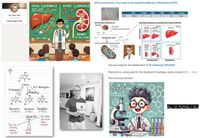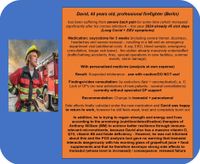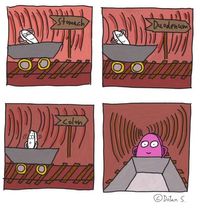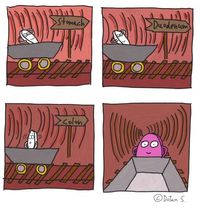Professor Eric Chan with PK Weekly Dose on LinkedIn
Professor Eric Chan and the "PK Weekly Dose" – Bridging Science, Humanity, and Innovation
As a strategist, my passion lies in exploring the depths of personalized medicine. In this domain, Professor Eric Chan stands as a true beacon of knowledge and inspiration. His exceptional platform, "PK Weekly Dose," has become a pioneering space for knowledge transfer, interdisciplinary exchange, and collaborative scientific advancement — all under the guiding principle: "Learning without Barriers."
An Innovative Approach to PK Knowledge Sharing
What makes PK Weekly Dose truly unique is not just Professor Chan’s dynamic, engaging, and scientifically rigorous presentation but also his deeply personal perspective. He is not only a distinguished scientist and professor but also a father and a patient — an aspect that lends his work an extraordinary authenticity.
At the age of 30, he suffered his first heart attack, followed by restenosis 17 years later, and a second heart attack 21 years after that. His personal experience as a patient fuels his determination to explore groundbreaking treatment strategies (Source: LinkedIn). His profound understanding of these challenges, coupled with his scientific expertise, gives his contributions a weight that extends far beyond conventional academic research.
This unique blend of human experience, pharmacogenetic expertise, and a touch of spirituality makes his insights invaluable. It's no surprise that his work has gained widespread recognition and, within the community, a near "addictive potential."
My Experience with the PK Community
Since 20 month, I have been an active member of his PK community, sharing my own case studies, insights, and scientific knowledge. Like many other members, I eagerly anticipate each new edition of PK Weekly Dose — not only as a source of valuable information but also as an opportunity for meaningful exchange and scientific progress.
I wholeheartedly recommend this forum to clinicians, physicians, pharmacists, PK experts, and anyone interested in delving deeper into the world of pharmacogenetics. Professor Eric Chan conducts research from the laboratory to the bedside and back again — an integrative approach essential for the development of patient-centered solutions.
Who Is Professor Eric Chan?
Professor Eric Chan is a pharmaceutical scientist at the Faculty of Pharmacy and Pharmaceutical Sciences at the National University of Singapore (NUS) (since 2006). His research interests (1) include:
- Physiologically-based pharmacokinetic-pharmacodynamic (PBPK-PD) modeling, exploring pharmacological and toxicological effects, (2)
- Investigation of xenobiotic-derived reactive metabolites, particularly their interactions with biological proteins, (3)
- Systems biology-driven modeling of pathology, pharmacology, toxicology, and mammalian-host–bacteria interactions.
Professor Chan currently serves as the Deputy Head of Research at NUS and is a member of the Faculty Promotion and Tenure Committee (FPTC). He is a scientific advisor for Hyloris Pharmaceuticals and the ASTAR Experimental Drug Development Centre (EDDC)*. Additionally, he is the Senior Editor of the British Journal of Clinical Pharmacology and an editorial board member for Biochemical Pharmacology, Drug Metabolism and Disposition (American Society of Pharmacology and Experimental Therapeutics, ASPET), and Journal of Chromatography B.
He was awarded the Dean's Chair Professorship at the Faculty of Science (2015–2018) and has received multiple academic honors, including six Faculty of Science Teaching Excellence Awards and four NUS Annual Teaching Excellence Awards.
Science with Heart and Vision
Professor Eric Chan masterfully combines scientific excellence with human experience. His work sets new standards for interdisciplinary knowledge sharing and the advancement of personalized medicine. Through PK Weekly Dose, he not only conveys complex pharmacogenetic concepts in an accessible way but also fosters meaningful scientific dialogue and drives valuable research insights forward.
Thank you, Eric, for your inspiring work and your unwavering dedication to the PK community!
Why Am I Doing All This? – A Call for the Comprehensive Integration of Personalized Medicine
We all face profound and very real challenges together. The increasing strain on healthcare systems, the rising prevalence of chronic and complex diseases, and their broader societal impacts underscore the limitations of conventional medical approaches.
Due to my own highly complex medical case, I have never been fully bound by traditional scientific structures or rigid regulatory frameworks. However, this independence allows me to approach problems with an open 360-degree perspective, meticulously analyzing each aspect and contributing to holistic problem-solving. I find great fulfillment in delving deep into scientific studies, identifying overlooked challenges, and extracting insights that could lead to meaningful advancements.
An Interdisciplinary Perspective Beyond Scientific Convention
Scientists have often asked me: “How do you manage to integrate all these complex elements? You come from a background in communication, marketing and strategy.”
That’s true!
But my passion has always extended to biology, chemistry, and nutrition. Since childhood, I have been fascinated by the intricacies of nature, and my father — a strict yet deeply loving analytical thinker with vast knowledge — instilled in me a deep appreciation for understanding the world. He encouraged me not just to observe but to feel, comprehend, smell, hear, and taste my surroundings.
One of my favorite books is “Surely You’re Joking, Mr. Feynman.” It has long inspired me to approach scientific questions with curiosity and ingenuity.
Personal Motivation: First-Hand Experience
No doctor, scientific study, or lab report knows my body as intimately as I do. No one else has experienced the life-threatening adverse drug reactions (ADRs) that have followed me since childhood.
I vividly remember a mountain trek at 2,800 meters altitude, where I nearly fell 500 meters due to sudden blood sugar fluctuations — triggered by eating two bananas and some dried fruit. At the time, I was unaware that I had a genetic predisposition to insulin sensitivity issues. That experience was pivotal, driving me to systematically investigate why these reactions occur, when they happen, and what triggers them.
Lack of Medical Support and the Need for Proactive Research
For years, I repeatedly heard: “We are not accepting new patients.” My inquiries to clinics and specialists went unanswered, and phrases like “Your case is too complex — I can’t help” or “Search online for centers specializing in rare diseases” offered no solutions.
Yet, my life had to move forward — with or without medical guidance. So, I chose to engage proactively and wholeheartedly, diving into extensive research fueled by curiosity and determination. Along this journey, I have encountered extraordinary individuals, including Professor Eric Chan, whose expertise and perspective have profoundly influenced me.
Personalized Medicine: More Than Just a Genetic Fingerprint
At the core of my work is the understanding that personalized medicine is far more than a genetic profile. Across scientific debates and consensus discussions, I consistently see one critical PRO factor missing in the urgent and broad implementation of PGx:
Ensuring the stability and security of cities, countries, and regions.
The absence of personalized medicine and PGx does not only pose individual health risks — it can also jeopardize essential infrastructure. High rates of illness due to poorly optimized medications, rising recurrence rates, drug resistance, ADRs, and prolonged hospital stays all contribute to systemic vulnerabilities.
To highlight the broader implications, I have compiled a collection of personas demonstrating how the lack of personalized medicine threatens the stability of key societal functions — ranging from law enforcement, emergency services, education, corporate sectors, and insurance providers to critical infrastructure, transportation and mental health support systems.
A Systemic Paradigm Shift Is Essential
Each of these personas underscores the reality that the absence of personalized medicine affects not just individuals, but entire societies. Immediate action is needed to transform healthcare into a more precise, adaptive, and resilient system.
The future of medicine cannot rely solely on genetic analysis. Instead, a sustainable integration of interdisciplinary insights, practical implementation strategies, and systemic innovation is required to ensure that healthcare systems remain robust and effective in the long term.
In this context, we also recommend visiting the categories
“Development of more robust ‘ecosystems’”
“PGx analyses and the lack of consensus”
“Graphics”
“Two (large) worlds have emerged”
among many others ...
There are many wonderful ways to present the topics of pharmacokinetics, pharmacodynamics and pharmacogenetics in an exciting and lively way for everyone. In my search for exciting new pharmacokinetic topics, I came across the wonderful artwork of Dotan Shaniv, a pharmacist at Kaplan medical center, which I would like to share with you here (with his kind permission to use it).
Deutsch
Professor Eric Chan und die „PK Weekly Dose“ – Eine Brücke zwischen Wissenschaft, Menschlichkeit und Innovation
Als Strategin ist es meine Leidenschaft, tief in die Welt der personalisierten Medizin einzutauchen. In diesem Kontext stellt Professor Eric Chan für mich einen echten Leuchtturm dar – mit seinem außergewöhnlichen Format „PK Weekly Dose“, einer einzigartigen Plattform für Wissenstransfer, interdisziplinären Austausch und kollaborative wissenschaftliche Weiterentwicklung. Immer unter dem inspirierenden Motto: „Learning without Barriers“.
Ein innovatives Format für PK-Wissensvermittlung
Was PK Weekly Dose so besonders macht, ist nicht nur die kreative, spannende und wissenschaftlich fundierte Aufbereitung durch Professor Chan, sondern auch die persönliche Perspektive, die er in seine Beiträge einfließen lässt. Er ist nicht nur ein angesehener Wissenschaftler und Professor, sondern auch ein Familienvater und Patient – eine Kombination, die seinen Veröffentlichungen eine bemerkenswerte Authentizität verleiht.
Mit 30 Jahren erlitt er seinen ersten Herzinfarkt, 17 Jahre später eine Restenose und 21 Jahre später einen zweiten Herzinfarkt. Diese persönlichen Erfahrungen treiben ihn an, bahnbrechende medizinische Fortschritte voranzutreiben (Quelle: LinkedIn). Sein tiefes Verständnis für die Herausforderungen aus der Perspektive eines Patienten verleiht seinen Arbeiten eine besondere Tragkraft, die weit über die klassische akademische Forschung hinausgeht.
Diese menschliche Perspektive gepaart mit exzellentem pharmakogenetischem Fachwissen und einer Prise Spiritualität macht seine Beiträge einzigartig. Kein Wunder, dass sie innerhalb der Community ein regelrechtes „Suchtpotenzial“ entfalten.
Meine Erfahrung mit der PK-Community
Seit 20 Monaten bin ich aktives Mitglied in seiner PK-Community, teile meine eigenen Fallstudien, Erkenntnisse und wissenschaftlichen Analysen. Wie viele andere Mitglieder freue ich mich auf jede neue Ausgabe der PK Weekly Dose – denn sie ist nicht nur eine Quelle wertvoller Informationen, sondern auch ein Raum für gemeinsamen Austausch und wissenschaftlichen Fortschritt.
Ich kann dieses Forum nur nachdrücklich empfehlen – sei es für Kliniker, Ärzte, Apotheker, PK-Experten oder Interessierte, die tiefer in die Welt der Pharmakogenetik eintauchen möchten. Professor Eric Chan betreibt Forschung vom Labor bis zum Krankbett und wieder zurück – eine integrative Herangehensweise, die essenziell für die Entwicklung nachhaltiger, patientenzentrierter Lösungen ist.
Wer ist Professor Eric Chan?
Professor Eric Chan ist Pharmazeut und Wissenschaftler an der Fakultät für Pharmazie und Pharmazeutische Wissenschaften der National University of Singapore (NUS) (seit 2006). Seine Forschungsinteressen umfassen:
- Physiologisch basierte pharmakokinetisch-pharmakodynamische (PBPK-PD) Modellierung zur Untersuchung pharmakologischer und toxikologischer Effekte,
- Forschung zu xenobiotisch abgeleiteten reaktiven Metaboliten, insbesondere deren Interaktion mit biologischen Proteinen,
- Systembiologische Modellierung von Pathologie, Pharmakologie und Toxikologie, einschließlich der Wechselwirkungen zwischen Säugetierwirt und mikrobiellen Erregern.
Professor Chan ist stellvertretender Leiter der Forschungsabteilung an der NUS und Mitglied des Ausschusses für Fakultätsbeförderung und Ernennung. Er berät Hyloris Pharmaceuticals sowie das ASTAR Experimental Drug Development Centre (EDDC)* und ist leitender Redakteur des British Journal of Clinical Pharmacology. Zusätzlich gehört er mehreren Redaktionsbeiräten renommierter Fachzeitschriften an, darunter Biochemical Pharmacology, Drug Metabolism and Disposition und Journal of Chromatography B.
Er wurde mit der Dean's Chair Professur an der Fakultät für Naturwissenschaften ausgezeichnet (2015–2018) und erhielt mehrfach akademische Lehrpreise, darunter sechsmal den Faculty of Science Teaching Excellence Award und viermal den NUS Annual Teaching Excellence Award.
Wissenschaft mit Herz und Verstand
Professor Eric Chan verbindet in einzigartiger Weise wissenschaftliche Exzellenz mit menschlicher Erfahrung. Seine Arbeiten setzen neue Maßstäbe für die interdisziplinäre Wissensvermittlung und die Weiterentwicklung der personalisierten Medizin. Durch Formate wie PK Weekly Dose gelingt es ihm, komplexe pharmakogenetische Zusammenhänge verständlich zu vermitteln, fachlichen Diskurs zu fördern und wertvolle Impulse für die Forschung zu liefern.
Ich danke dir, lieber Eric, für deine inspirierende Arbeit und deinen unermüdlichen Einsatz für die PK-Community!
Warum tue ich das alles? – Ein Plädoyer für die umfassende Integration personalisierter Medizin
Wir stehen gemeinsam vor großen und sehr realen Herausforderungen. Die zunehmende Belastung der Gesundheitssysteme, die steigende Zahl chronischer und komplexer Erkrankungen und die damit verbundenen gesellschaftlichen Auswirkungen machen deutlich, dass herkömmliche medizinische Ansätze oft nicht ausreichen.
Aufgrund meines eigenen komplexen Falles hat mich die klassische, fest strukturierte wissenschaftliche Forschung nie vollständig eingebunden. Diese Freiheit ermöglicht mir jedoch, mit einem offenen 360-Grad-Blickwinkel an die Probleme heranzugehen, jedes Detail sorgfältig zu analysieren und zur ganzheitlichen Problemlösungsfindung beizutragen. Es erfüllt mich mit Leidenschaft, tief in wissenschaftliche Studien einzutauchen und bisher unbeachtete Problemstellungen herauszuarbeiten.
Interdisziplinäre Perspektive statt wissenschaftlicher Konventionen
Wissenschaftler haben mich schon häufiger gefragt: „Wie gelingt es dir, all diese komplexen Zusammenhänge zusammenzuführen? Du kommst doch eigentlich aus der Kommunikation, dem Marketing und der Strategie?“
Das stimmt!
Doch schon seit meiner Kindheit begeisterte mich die Welt der Biologie, Chemie und Ernährung. Naturwissenschaftliche Phänomene faszinierten mich, und mein Vater – ein analytisch denkender Stratege mit immensem Wissensschatz – vermittelte mir einen tiefen, greifbaren Zugang zur Welt. Er lehrte mich, nicht nur hinzusehen, sondern wirklich zu fühlen, zu begreifen, zu riechen, zu hören und zu schmecken.
Eines meiner Lieblingsbücher ist „Sie belieben wohl zu scherzen, Mr. Feynman“. Es hat mich tief inspiriert, wissenschaftliche Fragen mit Neugier und Kreativität anzugehen.
Meine persönliche Motivation: Erfahrung aus erster Hand
Kein Arzt, keine wissenschaftliche Publikation und keine Laboranalyse kennt meinen Körper so gut wie ich selbst. Niemand sonst hat die lebensbedrohlichen unerwünschten Arzneimittelwirkungen (UAWs) erlebt, die mich von Kindheit an begleitet haben.
Ich erinnere mich lebhaft daran, wie ich bei einer Bergtour auf 2800 Metern Höhe beinahe 500 Meter in die Tiefe gestürzt wäre – ausgelöst durch Blutzuckerschwankungen nach dem Verzehr von zwei Bananen und etwas Trockenobst. Damals wusste ich noch nicht, dass ich eine genetisch bedingte Insulinsensitivitätsstörung habe. Die Erfahrung war prägend, und ich begann systematisch zu erforschen, warum solche Reaktionen auftreten, wann sie geschehen und welche Auslöser sie begünstigen.
Fehlende Versorgung und Eigeninitiative
Über Jahre hinweg hörte ich immer wieder: „Wir nehmen keine neuen Patienten an.“ Fachärztliche Anfragen blieben unbeantwortet, und Sätze wie „Ihr Fall ist zu komplex, ich kann Ihnen nicht helfen“ oder „Suchen Sie im Internet nach Zentren für seltene Erkrankungen“ führten ins Leere.
Doch mein Leben musste weitergehen – ob mit oder ohne medizinische Unterstützung. So begann ich proaktiv und mit Herzblut in die Materie einzutauchen. Neugierde und Leidenschaft trieben mich an, und auf diesem Weg begegnete ich inspirierenden Persönlichkeiten wie Professor Eric Chan, die mich nachhaltig beeinflusst haben.
Personalisierte Medizin: Mehr als ein genetischer Fingerabdruck
Am Ende dieser Rubrik möchte ich verdeutlichen, dass personalisierte Medizin weit mehr ist als eine bloße genetische Analyse.
In allen wissenschaftlichen Debatten und Konsensdiskussionen vermisse ich einen entscheidenden PRO-Faktor für die dringende und weitreichende Einführung von PGx: Die Sicherheit und Stabilität von Städten, Ländern und Regionen.
Eine fehlende Implementierung personalisierter Medizin und PGx kann nicht nur individuelle Gesundheitsrisiken bergen, sondern auch wichtige Infrastrukturen gefährden. Ein hoher Krankenstand aufgrund nicht optimierter Medikation, steigende Rückfallquoten, Resistenzen, UAWs und verlängerte Krankenhausaufenthalte können zu kritischen Versorgungslücken führen.
Um diese Auswirkungen sichtbar zu machen, habe ich eine Kollektion von Personas zusammengestellt. Diese verdeutlichen, wie die fehlende Berücksichtigung personalisierter Medizin die Stabilität essenzieller Systeme beeinträchtigen kann – von Polizei und Feuerwehr über Bildungsinstitutionen, Wirtschaftsunternehmen und Versicherungen bis hin zu Notfallversorgung, Seelsorge und Gütertransport.
Ein systemischer Paradigmenwechsel ist notwendig
Jede dieser Personas zeigt, dass fehlende personalisierte Medizin nicht nur den Einzelnen betrifft, sondern die gesamte Gesellschaft. Wir müssen dringend handeln, um die medizinische Versorgung zu revolutionieren und eine ganzheitliche, individualisierte Strategie zu etablieren.
Die Zukunft der Medizin darf nicht allein in genetischen Analysen verharren. Vielmehr braucht es eine nachhaltige Integration von interdisziplinären Erkenntnissen, praxisnahen Implementierungen und strategischen Weichenstellungen, um Gesundheitssysteme langfristig belastbar und effizient zu gestalten.
In diesem Context empfehle ich Ihnen auch den Besuch der Rubriken
„Entwicklung robusterer „Ökosysteme“
„PGx-Analysen und der fehlende Konsens“
„Grafiken“
„Zwei (große) Welten sind entstanden“
„Welten verbinden“
„Spielerliste“
„Erfolge“ ...
Es gibt viele wunderbare Möglichkeiten die Themen Pharmakokinetik, Pharmakodynamik und Pharmakogenetik spannend und lebendig für "JEDERMANN" darzustellen. Auf meiner Suche nach spannenden neuen pharmakokinetischen Themen bin ich auf die wunderbare Artwork-Darstellung von Dotan Shaniv, Pharmacist vom Kaplan medical center gestoßen, die ich Ihnen hier (mit seiner freundlichen Genehmigung zur Nutzung) nicht vorenthalten möchte.
A journey into the world of pharmacokinetics can be so exciting!











